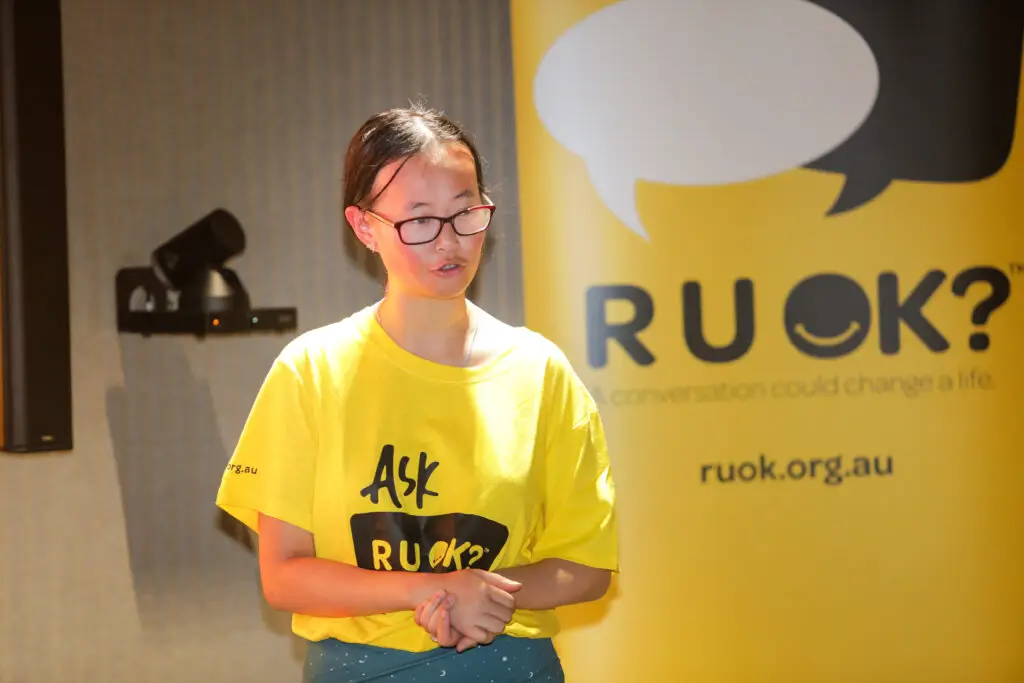Content warning: This article discusses mental health.
By the time Rebecca Yu was in high school, she had already learned how to hide her pain. Depression and suicidal ideation were part of her daily reality, but she didn’t have the words to explain what she was going through, or the confidence to believe anyone would care.
Then something shifted.
“It was the check-ins,” Rebecca says. “My teachers didn’t just ask once. They kept asking. They saw me. They listened. They kept showing up. And that made me feel like I mattered.”
Those conversations changed everything. With their encouragement, Rebecca sought professional mental health support for the first time.
She says that stigmas in her community around mental health also added a layer of complexity when she considered seeking support for her mental health.
“My culture still often views mental health as a taboo topic, with the mindset of ‘out of sight, out of mind’. So daring to break free of the cultural perspective and negative stereotypes was quite scary,” she explains.
“At the beginning, I only told my mum, and that was only because she was my designated driver to appointments. I’m lucky that she was supportive – willing to drive me to appointments, take me to the GP with her Medicare card, accepting when I made the choice to try antidepressants.
“We never spoke about mental health at the beginning of my journey, but over time, she has become more curious and asked questions. My sister has also been more supportive over the years, which I’m thankful for. With my dad, he still holds tight to the Chinese culture. However, he does try his best to be as supportive as he can verbally.”

Now, as an R U OK? Community Ambassador and lived experience speaker, Rebecca is using her lived experience to help others feel seen, heard, and supported. She’s completed Mental Health First Aid, ASIST and esuicideTALK, and worked as both a peer support worker and a mental health intake and assessment officer. Her message is clear: you don’t need to be an expert to make a difference.
“I know what it’s like to feel invisible,” she says. “And I know how powerful it is when someone genuinely asks, ‘Are you OK?’ That question saved my life.”
Rebecca’s story echoes the findings of new research released by R U OK? ahead of R U OK?Day 2025 (September 11, 2025). While three in four Australians believe it’s important to regularly ask someone if they’re OK, a third still hesitate, even when they sense someone might be struggling. The reasons? Fear of saying the wrong thing, invading someone’s privacy, or not knowing how to help.
But the data tells a different story. According to R U OK? Board Member and suicidologist Annie Fardell Hartley, 88% of people feel grateful and supported when someone checks in with them. “People don’t expect you to have all the answers,” she says. “They value trust, genuine care, and someone who really listens.”
Rebecca agrees, saying: “You don’t have to fix everything. Just showing up and asking the question can be enough.”
The R U OK? message, ‘Ask R U OK? Any Day,’ is a reminder that meaningful conversations shouldn’t be reserved for one day a year. With three quarters of Australians currently experiencing elevated distress, the need for connection is more urgent than ever.
Rebecca’s lived experience is a testament to the power of persistence. “It wasn’t just one conversation,” she says. “It was the consistency. The fact that someone kept showing up for me.”
She hopes her story will encourage others to do the same. “If you’re worried about someone, ask. And if you’re not sure what to say, R U OK? has resources to help. You’ve got this, and they’ve got your back.”
Because sometimes, the smallest question can lead to the biggest change.
If you or anyone you know requires confidential support, call Lifeline on 13 11 14 or Beyond Blue.
Top photo – Pictured: Rebecca Yu, Source: Supplied

